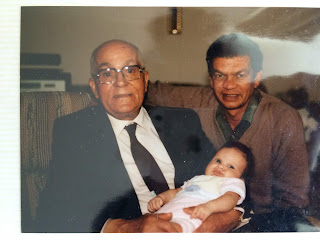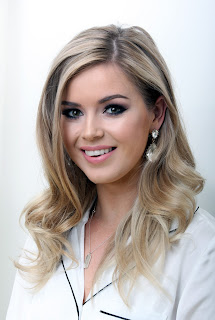Jessica, the Occupational Nurse with Clout
She wanted to work from home while she cared for her baby, now three years later occupational health nurse Jessica Clout owns Taranaki’s largest health and safety company.
“Haha, I’m learning how to be better at that,” Jessica says. “As we’ve continued to grow I’ve managed to engage some supportive staff to help me.”
It hasn’t always been that way.
Readers might remember Jessica’s husband Daniel. The couple were preparing to welcome their first daughter Ayla into the world when Daniel’s much-maligned car clamping business turned sour.
At the lowest point, Daniel received daily death threats from those angry about having their tyres clamped. He was spat on, held in a choke hold and even received an open head wound from a vicious beating. He was also hauled through the courts.
Reluctantly, he let the business go and the new family found themselves jobless.
“We faced a lot of injustices,” Jessica says. “If it wasn’t for our faith, I don’t know how we could have gotten through that.”
Jessica attributes that horrendous time and the loving support of her husband in helping her take the first steps to create a successful occupational health and workplace safety business.
Jessica aims to make the company as comprehensive as possible, often studying in her own time to bring herself up to speed.
Working for Health offers services ranging from vaccines and vision tests to air quality monitoring and asbestos testing.
While based in Taranaki, the company’s services stretch to the Manawatu and Bay of Plenty and Jessica has extensive networks up and down the country.
Services are also offered to offshore mining vessels with plans to extend the service abroad. “It’s a unique service nationally and globally.”
In just three years she has built the company from just herself to employing more than 25 staff. She was also elected to represent Taranaki on the New Zealand Occupational Health Nurses Association.
The world of occupational therapists and workplace safety ‘experts’ is surprisingly full of cowboys. They put the fear of prison into employers as a means of coercing them to use their services.
“It’s false and it shouldn’t be your motivation,” Jessica says.
This is especially true following on from the new Health and Safety at Work Act, which puts the onus on businesses as well as staff for maintaining safe workplaces and staff health.
“Nothing grinds me more than when a business is wanting to keep their workers safe and are paying someone a huge sum of money and that company’s giving them the wrong advice because they don’t know what they’re talking about.”
In the New Zealand Institute of Safety on which Jessica is a branch manager, members are working towards mandatory accreditation for companies specialising in occupational therapy and workplace safety, as ironically, there’s little to stop the cowboys from operating.
“In the past, the regulator was seen as the one with a big stick and people thought ‘hopefully they won’t talk to me’.
“Now there’s more of a spotlight on businesses following the Pike River tragedy, that’s where the regulator WorkSafe NZ was born.
“Now the regulator takes a more proactive approach about workplace safety and health. Health is a part of that too now.”
It’s the difference between moving a trip hazard off the floor to also making sure, say, the air is safe to breathe. It’s more complex but that’s why Jessica wants to make meeting new standards easy.
And who makes sure WorkSafe NZ complies with standards? None other than Jessica’s business, Working for Health in little old New Plymouth.
If a business is asking for a service that Working for Health doesn’t provide, Jessica will seek a partner who does or will get her equipment and staff upskilled to provide it.
Such is the case with one of the latest offerings - quantitative respirator fit testing, or in layman’s terms, checking that your breathing mask fits correctly.
“So many times we have found masks that are wrongly fitted,” Jessica says. “To me that’s worse than not wearing a mask at all, because you believe you’re safe.”
Other new services include extensive asbestos testing, apparently its more rife than we imagined, and ear suctioning - a safer way to remove wax build-up or foreign matter from the ears than the older method of using water and a syringe.
Drug and alcohol testing makes up a fair chunk of the business, with cannabis and methamphetamine popping up in random workplace checks.
“One time we found three to four substances at a time in a random test. It was scary considering those drugs only stay in your system for three days and this was in the middle of the working week.”
Jessica is on the coalface of developing health and safety standards in workplaces in New Zealand and all the while she is a hands-on mum to raising the couple’s two children – Ayla, 4, and Sierra, 11 months.
Any mothers reading this should stop right here.
“When I was in labour with Sierra,” Jessica flashes a grin, “I had arranged a specialist nutritionist and sleep therapist to speak with us and for a shared morning tea.
“In between contractions I was organising the morning tea.”
A mere six days after giving birth Jessica was back at work, with baby in tow. “I attended an all-day meeting in Wellington with a three-week old baby. She was three months when I attended one in Auckland.
“I would pop her on my shoulder while I typed or talked on the phone. I’d tuck her into my shirt while she was feeding.”
Other times Sierra would sleep in a capsule under Jessica’s desk.
In the early days with her firstborn, Ayla, she taught herself coding so she could create Working for Health’s website.
But she attributes her success to Daniel’s role as househusband. “He has the harder job,” she insists.
Those who know Jessica say the company is an attribute to Jessica’s hard work, dedication to upskilling her staff to meet growing customers’ needs and that tricky skill of knowing how to be firm as well as fair.
“What gives in her life is sleep,” colleague Stella McAllum jokes. “She’s always very positive. She likes to move forward and problem solve,” the occupational health nurse-slash-health and safety consultant says.
“She’s firm when she needs to be without being confrontational.”
Jessica’s clearly doing something right.
In those early days when Jessica was juggling caring for her firstborn with fulltime work, she was approached by occupational nurses more senior than herself who wanted to work for her.
What was it they saw in her that they weren’t getting elsewhere?
“You can’t provide a service without people,” Jessica says. “Growing the staff and providing professional development opportunities, support and encouragement.
“That’s my business philosophy. That’s number one.”
That was drummed into Jessica by her first employer, occupational health nurse, Dora Smith.
Smith had networks up and down the country and was well known in her field. She saw something in Jessica, she hoped to pass her business onto her.
“I’ve always known she was my protégé. It was her ability to empathise and respect the client. A good occupational health nurse needs a certain personality.
“The client comes first but at times you have to be firm but do it in a way where you retain respect and trust from the client. Jessica has always been able to do that.”
- Live magazine








Comments
Post a Comment